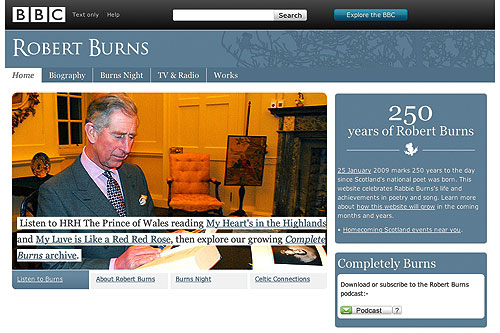Robert Burns at the BBC
Seeing as how it's Burns Night tonight, here's a bit more information on my latest website launch at work.

Last year, BBC Radio Scotland commissioned a project to record of all Robert Burns's works. My job was to publish them as a permanent online archive: The Complete Burns.
There were already plenty of places around the web where one could read Burns's works, but these new audio recordings - by some very familiar Scottish readers - were something a bit special and deserved some thought to avoid the less famous ones getting lost or forgotten about once 25 January was over for another year.
Metadata
With over 600 works to Burns's name, adding value to the website had to start right at the beginning of the project to avoid a nightmare. What sort of value? Data about the works themselves: they year it was written; whether it's a poem or a song; what sort of themes it discusses; links to related resources elsewhere online; and many many more.
We were determined not to write any new content management software, but were equally mindful that those entering this data were not used to seeing or working with any sort of interweb-style markup. Eventually, we realised that the answer was good old-fashioned XML, conveniently edited in - of all things - Microsoft Word, which does a fine job of turning anything between < and > into friendly purple flags.
Generating our pages then became as simple as running the XML through a selection of XSL templates before checking and publishing. With all this data at our fingertips and the freedom to generate any number of outputs, our thoughts turned to exactly what to make.
Nice URLs
For now, we've kept ways of discovering Burns's works pretty simple:-
- Alphabetical listings (a bunch of text links - woohoo!);
- Lists by reader (pretty picture of famous people - check!);
- Lists by year (and a pretty graph to finish - yay!).
From the outset, we tried to use simple, guessable URLs. For example, listing works from 1785 is as obvious as ... works/years/1785/; a list of epitaphs would be ...works/types/epitaph/; and an individual work is simple: ... works/a_mans_a_man_for_a_that/.

In abiding by the principles of semantic markup, easy & permanent URLs and plenty of juicy linked data, my hope is that visitors come for the famous stuff and manage to lose themselves in a breadth of unexplored masterpieces.
Other than the publishing of even more than the 100 works already live, the future may also see additional navigational pathways (by location or theme, perhaps) and the release of the metadata in its raw XML form for other developers to play with.
You may also have noticed in the news that Prince Charles has contributed two readings. He insisted on involving himself in an earlier project of mine, too. I'm going to have to take out a restraining order at this rate...